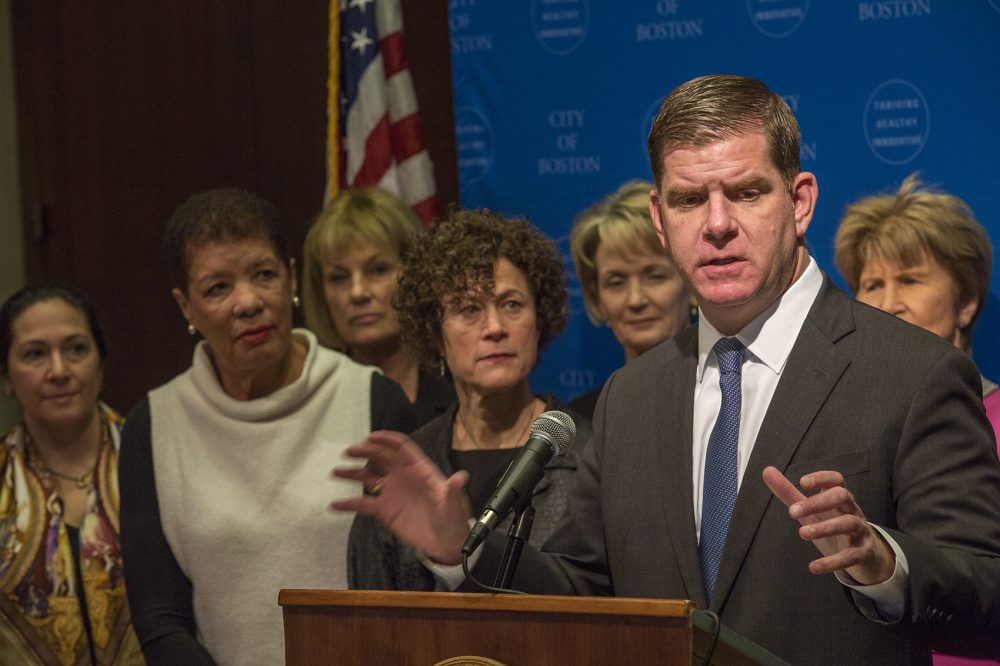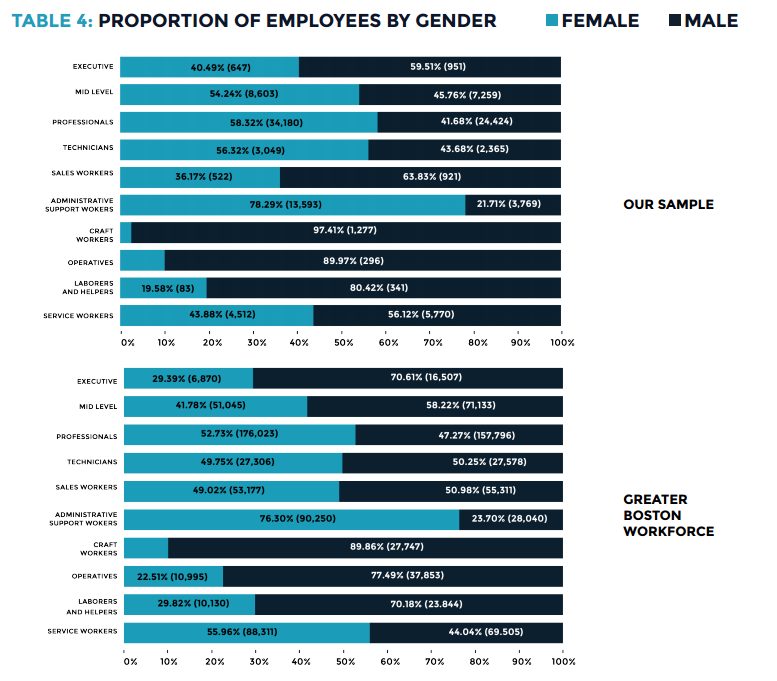Advertisement
Report: Women In Greater Boston Earn 77 Cents For Every Dollar Men Earn

The gender wage gap in the Boston area may be a bit wider than previously thought, according to a new report.
The report, released Thursday by the city, found women in Greater Boston earn 77 cents for every dollar earned by men.
That's a slightly larger gap than other estimates of the local wage gap. For example, it's estimated women in the city of Boston earn 83 cents for each dollar men make. It's estimated women in the state overall also make 83 cents for every dollar men make. And nationally, women earn 80 cents for every dollar men make, according to a report released this past fall.
The new report uses a different methodology to measure the wage gap than the other estimates. The city report looked at wage data reported directly by employers — the first time such data has been used to assess the pay gap, according to the report. Studies of the wage gap typically use census data and information from the Bureau of Labor Statistics — which gather information directly from employees.
The city believes its report represents a more accurate account of the gender wage gap.
"Employers, in providing this data, are filing what they report to the IRS, what they report to the [U.S. Equal Economic Opportunity Commission], so it appears to us that it is far more accurate reflections of who’s earning what," said Evelyn Murphy, the co-chair of the Boston Women's Workforce Council, which issued the report.
Additionally, the report defines Greater Boston as all ZIP codes within I-495, whereas the federal government defines Greater Boston more broadly, stretching out to southern New Hampshire, Murphy said. So the city worked with the EEOC to develop a database of wage data within I-495 in order to compare "apples to apples," Murphy added.
The city's report gathered anonymized data from 69 companies that have signed onto the city's 100% Talent Compact, which is dedicated to closing the gender wage gap. (There are currently 179 companies signed on to the city's compact.) The report's data reflects wages for more than 112,000 employees — or about 11 percent of the Greater Boston workforce.
Further, the data the city collected from employers includes a higher proportion of women than the actual labor force — 58 percent women, versus the federal data that has the labor force about evenly split between men and women.
"The willingness of the participants to join the compact and share data could be an indication of the fact that they have more women in their workforce than average for the Greater Boston area," the report said.
Despite these differences, Mayor Marty Walsh said the city's report establishes an important baseline to measure future progress against.
"We’re able to take this information and use it as a data point to find out where we’re doing good, where we’re doing bad, where we need to do better — which right now I’d say [is] almost everywhere — and where we’ve made success in the future to come," Walsh said.
The city has been engaged in a number of initiatives to tackle the wage gap, including offering free salary negotiation workshops for women. So far, the city has trained more than 2,500 women and has a goal of reaching 85,000 women in the next few years. The city has also been working with employers to develop best practices and tackle equity in the workplace. Last year, equal pay legislation was signed into law in Massachusetts. Walsh applauded the bill, but said he wants to "go deeper" than legislative efforts by further engaging business leaders. The city is also working to get more companies to sign on to its compact in order to gather more data moving forward.
The report outlined some steps for companies to take to address the wage gap — including setting internal goals around wage equity, building a pipeline of talent, requiring diverse applicant pools for open positions, creating transparency around compensation, and providing workplace flexibility.
Some companies say they are already taking some of those steps.
"Our biggest issue is getting women into highest paying jobs," said Allison Quirk, the chief human resources office at State Street, a member of the city's compact.
Quirk said the bank provides unconscious bias training and has targets for diversity at the senior level.
"We have a dedicated sourcing team that does nothing but cultivate diverse sources of candidates at all levels to be able to ensure that we have a pipeline of qualified candidates coming through," Quirk said.
Eddie Ahmed, the chief human resources officer at MassMutual Financial Group, said his company also makes sure there's diversity on its interviewing panels. He said his company, which is part of the city's compact, hires an outside adviser every year to assess wages across the company.
"I don't think businesses start by saying they’re going to have a wage gap. I think businesses start assuming they don’t and then eventually somebody comes and says, 'Hey, maybe we should look at the data,' " Ahmed said. "We’re looking at that data now and asking ourselves what more should we do as firms to engage in closing this gap."
The city's report found the wage gap also varied by job category. The most equal pay was among mid-level workers and administrative workers — where women on average earned slightly more than men. The highest pay disparity was among service workers.
There were also disparities in bonuses. According to the report, men received a larger share of their compensation in cash bonuses than women — 12 percent of men's total pay, compared with 5 percent of women's total pay. This gap was widest at the executive level, where men earned $300,000 in cash performance pay on average, while women earned $82,000 on average. The report noted (see chart below) that the gender breakdown of jobs in the sample data is not proportionate to the gender breakdown of jobs using federal data.
The report doesn't include a racial breakdown of the gender wage gap — which tends to be much wider for women of color. The city said that information was left out because of "human error" — some companies didn't properly report information on race. The city said it plans to gather and assess that information moving forward.

